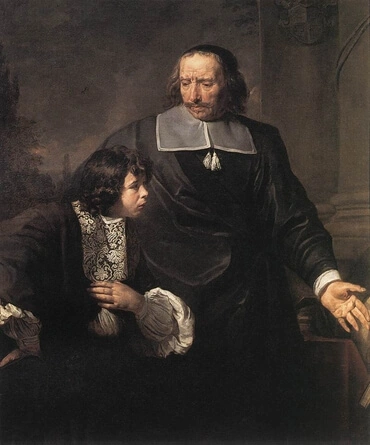1
Abraham nahm wieder ein Weib, die hieß Ketura.
2
Die gebar ihm Simran und Jaksan, Medan und Midian, Jesbak und Suah.
3
Jaksan aber zeugete Seba und Dedan. Die Kinder aber von Dedan waren: Assurim, Letusim und Leumim.
4
Die Kinder Midians waren: Epha, Epher, Hanoch, Abida und Eldaa. Diese sind alle Kinder der Ketura.
5
Und Abraham gab all sein Gut Isaak.
6
Aber den Kindern, die er von den Kebsweibern hatte, gab er Geschenke und ließ sie von seinem Sohn Isaak ziehen, weil er noch lebte, gegen den Aufgang in das Morgenland.
7
Das ist aber Abrahams Alter, das er gelebet hat, hundertundfünfundsiebenzig Jahre.
8
Und nahm ab und starb in einem ruhigen Alter, da er alt und lebenssatt war, und ward zu seinem Volk gesammelt.
9
Und es begruben ihn seine Söhne Isaak und Ismael in der zwiefachen Höhle auf dem Acker Ephrons, des Sohnes Zoars, des Hethiters, die da liegt gegen Mamre,
10
in dem Felde, das Abraham von den Kindern Heths gekauft hatte. Da ist Abraham begraben mit Sara, seinem Weibe.
11
Und nach dem Tode Abrahams segnete Gott Isaak, seinen Sohn. Und er wohnete bei dem Brunnen des Lebendigen und Sehenden.
12
Dies ist das Geschlecht Ismaels, Abrahams Sohns, den ihm Hagar gebar, die Magd Saras aus Ägypten;
13
und das sind die Namen der Kinder. Ismaels, davon ihre Geschlechter genannt sind: Der erstgeborene Sohn Ismaels Nebajoth; Kedar, Adbeel, Mibsam,
14
Misma, Duma, Masa,
15
Hadar, Thema, Jetur, Naphis und Kedma.
16
Dies sind die Kinder Ismaels mit ihren Namen in ihren Höfen und Städten, zwölf Fürsten über ihre Leute.
17
Und das ist das Alter Ismaels: hundertundsiebenunddreißig Jahre; und nahm ab und starb und ward gesammelt zu seinem Volk.
18
Und sie wohneten von Hevila an bis gen Sur gegen Ägypten, wenn man gen Assyrien gehet. Er fiel aber vor allen seinen Brüdern.
19
Dies ist das Geschlecht Isaaks, Abrahams Sohnes: Abraham zeugete Isaak.
20
Isaak aber war vierzig Jahre alt, da er Rebekka zum Weibe nahm, die Tochter Bethuels, des Syrers, von Mesopotamien, Labans, des Syrers, Schwester.
21
Isaak aber bat den HERRN für sein Weib, denn sie war unfruchtbar. Und der HERR ließ sich erbitten, und Rebekka, sein Weib, ward schwanger.
22
Und die Kinder stießen sich miteinander in ihrem Leibe. Da sprach sie: Da mir's also sollte gehen, warum bin ich schwanger worden? Und sie ging hin, den HERRN zu fragen.
23
Und der HERR sprach zu ihr: Zwei Völker sind in deinem Leibe, und zweierlei Leute werden sich scheiden aus deinem Leibe; und ein Volk wird dem andern überlegen sein, und der Größere wird dem Kleinem dienen.
24
Da nun die Zeit kam, daß sie gebären sollte, siehe, da waren Zwillinge in ihrem Leibe.
25
Der erste, der herauskam, war rötlich, ganz rauch wie ein Fell; und sie nannten ihn Esau.
26
Zuhand danach kam heraus sein Bruder, der hielt mit seiner Hand die Ferse des Esau; und hießen ihn Jakob. Sechzig Jahre alt war Isaak, da sie geboren wurden.
27
Und da nun die Knaben groß wurden, ward Esau ein Jäger und ein Ackermann, Jakob aber ein frommer Mann und blieb in den Hütten.
28
Und Isaak hatte Esau lieb und aß gern von seinem Weidwerk; Rebekka aber hatte Jakob lieb.
29
Und Jakob kochte ein Gericht. Da kam Esau vom Felde und war müde
30
und sprach zu Jakob: Laß mich kosten das rote Gericht, denn ich bin müde. Daher heißt er Edom.
31
Aber Jakob sprach: Verkaufe mir heute deine Erstgeburt.
32
Esau antwortete: Siehe, ich muß doch sterben, was soll mir dann die Erstgeburt?
33
Jakob sprach: So schwöre mir heute. Und er schwur ihm und verkaufte also Jakob seine Erstgeburt.
34
Da gab ihm Jakob Brot und das Linsengericht, und er aß und trank; und stund auf und ging davon. Also verachtete Esau seine Erstgeburt.







